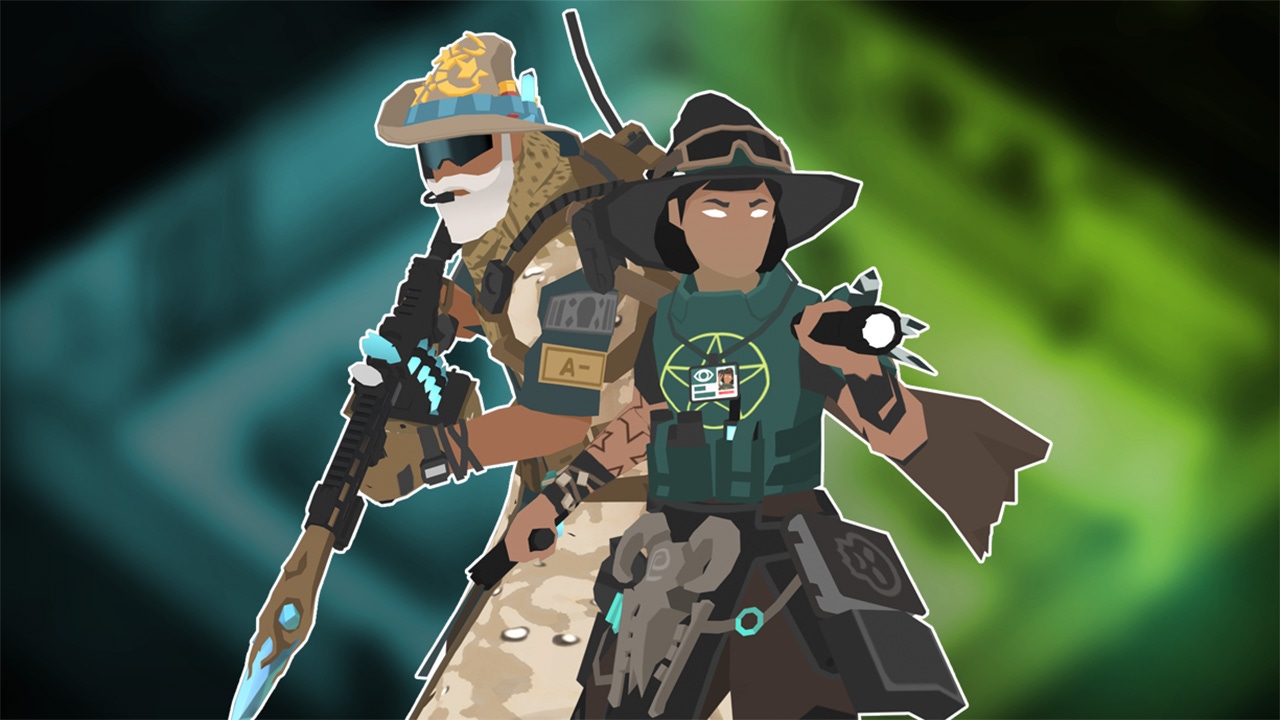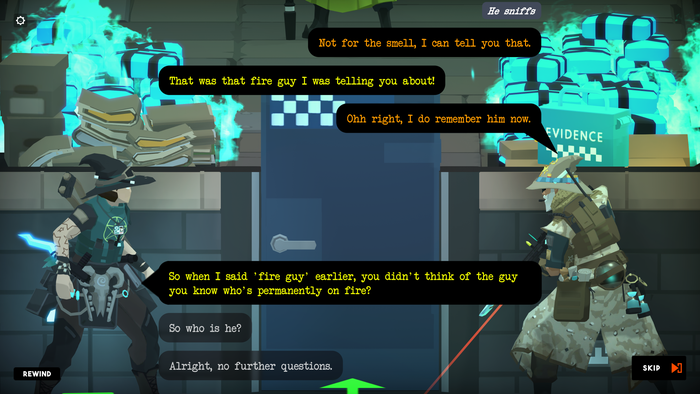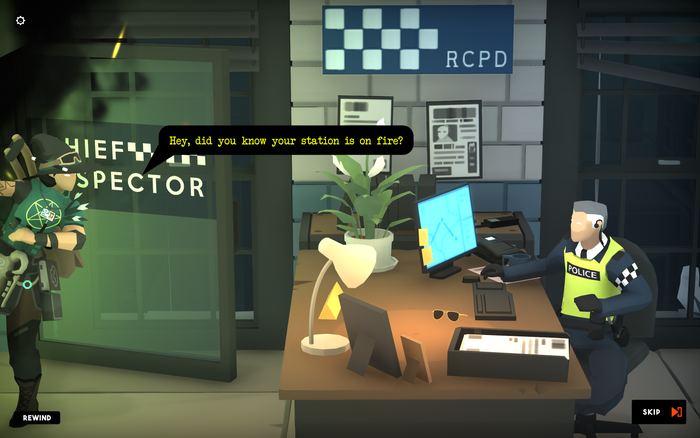Trending
Opinion: How will Project 2025 impact game developers?
The Heritage Foundation's manifesto for the possible next administration could do great harm to many, including large portions of the game development community.
Defenestration is always good comedy.

To tell the story of making Tactical Breach Wizards, you really need to start with the (excellent) name.
As Suspicious Developments' founder/director/designer/coder/writer tells it, the name existed long before the game did. When he was a journalist at PC Gamer, he and his pals joked about what a "fantasy" version of the many military games on the market might look like. In an era marked by the breach-and-clear combat themes of series like SOCOM U.S. Navy SEALs, Tom Clancy's Rainbow Six, and modern-day Call of Duty games, they settled on the silly name of "Tactical Breach Wizards." It conjures the image of Gandalf-type wizards with robes and pointed hats kicking in doors firing off M-16 rifles, shouting "go go go!" as magic spells fire off.
Several years (and two games, Gunpoint and Heat Signature) later, Francis remembered the name and realized it was a great fit for his next project. He was tackling the design problems he encountered while playing Firaxis' XCOM series. He's a massive fan, but was frustrated by how bad it could feel when characters died because of random chance or obfuscated information. "When you you make a tactical choice and it doesn't pan out, and you lose a [character], that feels bad," he explained in a conversation with Game Developer. "But when you just didn't understand how something about the game works...that feels really bad."
XCOM's designers might volley back at Francis that random failure or misunderstandings work well in the combat simulation series, which is celebrated for how it encourages players to struggle through loss. Fair enough! But then how would you make a turn-based strategy game that ensures players can fully understand what will happen and still be fun?
That's when the wizards kicked in the door and suddenly what was once a joke became a great idea for a game.
In the narrative of Tactical Breach Wizards, the gameplay is justified on the magical ability of Zan, a "Navy Seer" who can see glimpses of the future. It's a rare ability, so he was put in charge of a special forces unit on breach-and-clear missions. Now on the run with a group of "loveable idiots," he and his squadmates solve their problems using the power of quippy dialogue and tactical defenestration.
When a turn begins, time slows down and players are given space to experiment with the abilities of each character in the squad. Those abilities are themed to each unique character, and mix together mechanics like unit displacement, ricochet, damage transference, and beyond. All these abilities create interlocking outcomes, such as blasting an enemy into Zan's "overwatch" shot or deliberately blowing up one of your units so your "Necromedic" can bring them back to life.
That's where the game's comedy instincts start to kick in. Slapstick comedy has long been a part of Suspicious Developments' games, with Gunpoint being as interested in letting players smack themselves in the face with a door as they can an enemy guard. At many points in Tactical Breach Wizards players may blow themselves out a window, slam their own character into a wall, or accidentally poison themselves and not realize it until three turns later.
The genius, it turns out, is that sometimes the Looney Tunes-logic works out that self-defenestration is an effective decision. Francis said he and the team focused on making every interaction "satisfying" so when they arrived unexpectedly, they'd get a laugh out of the player. "That also drives my game design interests of emergence," he said. "We don't make super complex simulation games, but we do like having enough rules that things can surprise you while still making sense."
Because players can roll back any foibled moves, it takes the sting out of self-immolation. They don't know what the enemy will do the following turn, but they have complete agency over everything they can predict on the current turn.

Image via Suspicious Developments.
If this all sounds a bit familiar, you might be thinking about games like Subset Games' Into the Breach or MiMiMi's Shadow Gambit: The Cursed Crew. Both games did their best to let players plan, plot, and reset without overcommitting to failed strategies.
Francis mentioned chatting with the Into the Breach team about their work, and noted that they'd gone "smaller" than he'd been imagining when he thought of making a smaller-scale riff on XCOM. He admires their approach, but noted they ran into an "impossible task" of trying to explain all the possibilities through its user interface system. "You can't draw enough onscreen to show everything about how [a move] will work out."
He did still have to lean on a preview system similar to the one found in Into the Breach—which was something of a surprise. He thought if players had the freedom to explore every possibility they wouldn't need user interface elements telegraphing what would happen.
It turns out players do not in fact enjoy testing the outcome of 25 different tiles before finding the one that works for them. Some information just needed to be shown before they tested an action.
The biggest obstacle to implementing the simulation system was the process of saving and loading multiple game states. Tactical Breach Wizards benefits from having relatively small environments and a flat, polygonal art style with few textures. Older PCs and consoles might slow down saving and loading, but it's an easier task than what MiMiMi ran into with Shadow Gambit.
Still, logging every state and variable of objects, NPCs, and player characters is where you create exponential headaches. You can minimize that struggle by identifying which objects need to be saved. Objects like grenades, which only appear onscreen while thrown, don't need to be saved and can vanish into the void on reload.
Objects created during the foresight process might not vanish on reload. For instance some preview data is generated by creating copies of player characters that NPCs prioritize responding to, but those copies sometimes lingered during QA testing, making it look like the enemies were staring at ghosts.
Tactical Breach Wizard's crafty game design creates plenty of emergent comedy—but Suspicious Development's games have also won praise for their dry sense of humor. This game balances plenty of silliness with some sincere character drama, but making it all work showed Francis the limits of how games brushing up against real-world themes can competently address these issues.
Designing comedy games can be a massive challenge. Jokes tend to be funny the first time you hear them, and games involve plenty of repetitive actions that either kill good jokes or turn ordinary lines into meme fodder.
Francis' strategy across his three games has been to not explicitly flag them as "funny," but to keep the humor rapid-fire and ever present. He credits his love for Hitchhiker's Guide to the Galaxy author Douglas Adams as driving his "dry" sense of humor, and making it easy to slip comedic writing into the dialogue. His jokes aren't so much "setup and punchline," he said, but more about "being funny along the way."

Image via Suspicious Developments.
Developers doing comedy also sometimes struggle with having to hear their own jokes over and over again during playtesting, killing their ability to tell if they still land. Francis mentioned skipping around this by making sure he skipped dialogue sequences while testing gameplay, and putting plenty of time between writing jokes and reviewing them.
"The good thing is I have a terrible memory and when I read [the script] back, I'd forgotten most of the jokes," he admitted. "So if one makes me laugh then I know it was a great."
Comedy also tests writers to explore the unexpected, or dig into topics that really matter to the audience. Tactical Breach Wizards contains plenty of self-deprecating humor, and dedicates time for its characters to explore their anxieties and hangups of being ex-military/ex-criminals in an alternate universe Earth. In one example, the player characters need a place to lay low, so Zan leads them to...his mum's apartment. It has craft supplies to use so they can make a red string conspiracy board.
Zan's mother brings comedy to the bit by being the classic doting, wholesome figure in contrast to her stoic, grizzled son. But she's given depth through her comments about Zan's deceased father. She makes Zan uncomfortable by frequently badmouthing him and mocking how indecisive he could be.
Those were topics Francis was comfortable exploring. What he wasn't comfortable exploring was the dynamics of police abuse.
It's a relevant topic because in early previews of Tactical Breach Wizards, he introduced the Storm Wizard Jen as an ex-cop "Witch Cop," giving her a backstory for being skilled in SWAT team-style breach-and-clear tactics.
But as development moved into 2020, the protests against racist police violence inspired by the murder of George Floyd took off, and police SWAT units—ostensibly designed to called upon in the most dire situations—were exposed for their overuse and excessive death, such as in the killing of Breonna Taylor.
The protests began mere months after the release of Firaxis' XCOM: Chimera Squad, which unfortunately placed police SWAT-style raids dead center in the middle of its story.
Francis had been watching the release of Chimera Squad to see if it drifted too close to his own game (it didn't, mechanically or thematically), and found himself having to weigh if he could still have an ex-cop in his cast. For a moment he weighed giving Jen a story about leaving the police force because of its corruption and abuse, but it "never worked right" when friends read the script.
"I got a whole range of responses across the board that it was too harsh or not harsh enough," he explained. He said out that this feedback came from friends with fairly similar values, so this wasn't some cross-spectrum political focus test. One friend finally nailed why it wasn't working: in a game full of comedy, story beats about this issue felt unpleasant.
"Even if you trod the line perfectly it would still be an unwelcome reminder in this game," he said.
That's not an argument in favor of not addressing police brutality in games or avoiding political topics—Francis said it was more about recognizing he didn't have room to give the topic the space it deserved. "The game was never about those issues, so we'd only be handling them briefly. It was always going to feel rushed and shallow."
He went back to the core of what attracted him to Jen as a character and realized he cared more about her role as an investigator, not an enforcer. Luckily there's another character archetype that fits that role: the gumshoe, the PI, the private detective.

Image via Suspicious Developments.
Even better, Francis wrote Jen as a "provisional" private detective still earning her license, which gave him a framework to map her story onto. It also worked as a nice callback to Gunpoint, where the player character Conway is a classic pulp fiction private eye.
Francis' thought process shows how devs can evaluate feedback when their game's themes overlap with real-world issues. Sometimes criticism from multiple points of view will be a sign that what you're writing is working.
Other times it will indicate it's not working at all, and you need to figure out what fits better with your game.
Tactical Breach Wizards works so well because the Suspicious Developments team cracked a clever code: that strategy and dry humor both poke at the problem-solving part of the brain, and blending them together makes this game a stellar experience.
Both encourage the audience to take a moment to think about what's right in front of them, and when the pieces click together, there's a sense of joy in figuring something out. As more developers experiment with comedy, studying what gameplay styles blend with different ways of getting a laugh might be the way to make funnier—and still sincere—experiences.
You May Also Like